'Military Wives' Sharon Horgan interview: 'I like telling female stories'
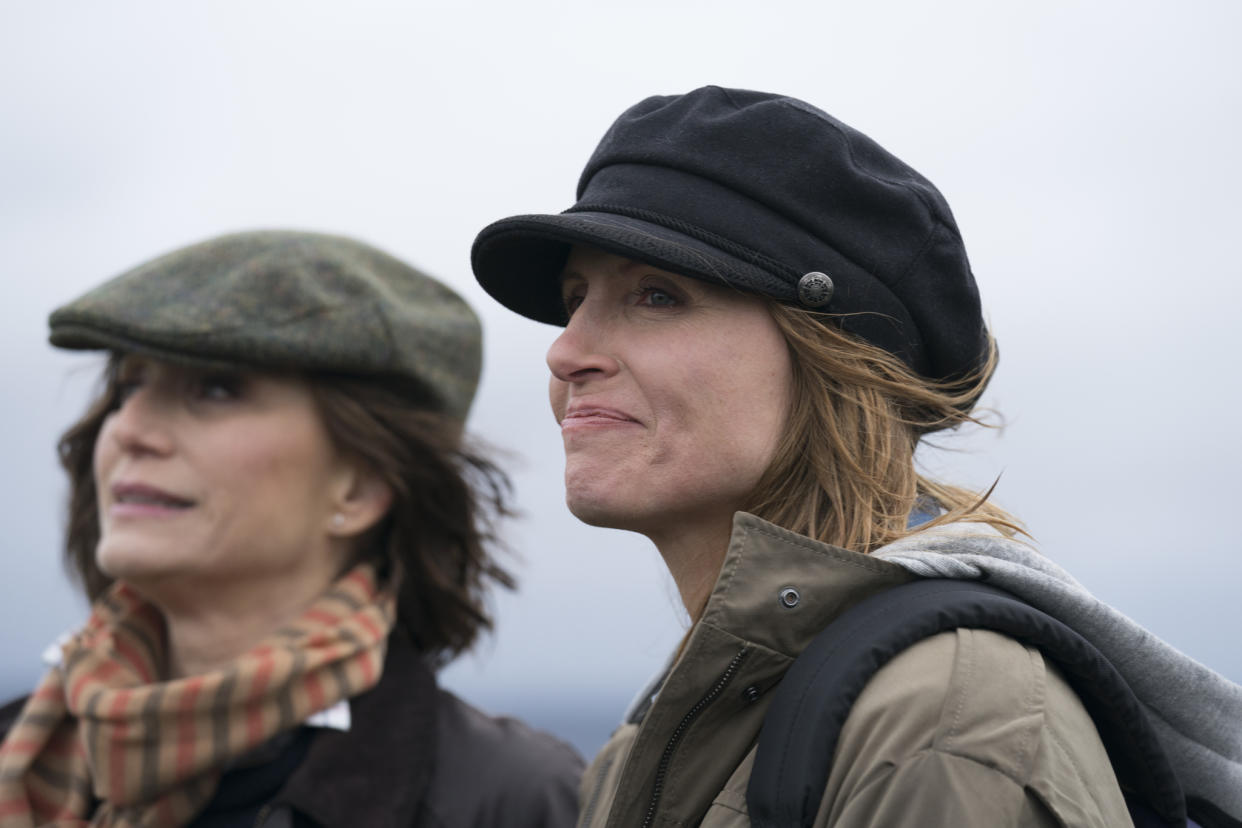
Sometimes the most uplifting story comes from the most unlikely source. Military Wives, the latest film from director Peter Cattaneo, reimagines a series of Gareth Malone’s BAFTA-winning The Choir, which followed a group of wives living on a British military base who form a choir to get through tough times when their husbands are deployed to Afghanistan.
The film, out 6 March, fictionalises some of the story, but retains the heart and triumph of the real-life tale in the same vein as Cattaneo’s seminal film The Full Monty.
Cattaneo tapped Sharon Horgan to star as Lisa, a military wife who finds herself charged with starting a choir alongside Kristin Scott Thomas’ Kate. It’s a surprisingly funny movie, with Horgan tapping into a similar sensibility as Catastrophe, and the actress pushed herself out of her comfort zone during the musical scenes.
Read more: Pretty Woman screenwriter debunks myths
Horgan, who runs her own production company Merman with Celia Mountford, became enmeshed in the world military wives, especially as the film shot on an actual military base in Yorkshire.
Here Horgan discusses what drew her to the story, why she wants to make female-led projects and whether she plans to sing again.
Yahoo Movies UK: Initially, what attracted you to this story?
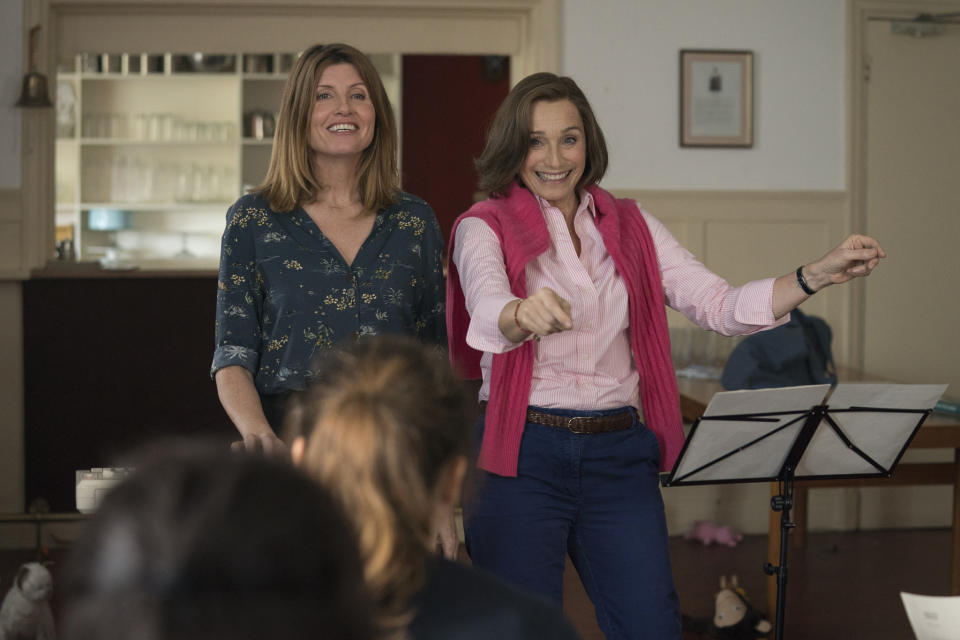
Sharon Horgan: It was one of those scripts where you were like, “F***k that really got me.” It was obviously what’s at the heart of the story, but then placing music around that – the singing and the choir coming together. I didn’t know anything, honest to God, about what it means to be the wife or the partner of someone who’s in the military, and a certain amount of that came across in the original script.
It just felt like a really good story and it made me cry when I read it. And the final movie is a really uplifting film. It makes you feel good. And then it was the fact that Peter was directing it and what he’d done with The Full Monty felt similar. I thought he did that really beautifully and it was funny as well as moving and warm – that’s what this film felt like it needed.
What sort of research did you do into the lives of real military wives?
Thankfully there was the documentary series made about it, which is what inspired the film, as well as the women’s stories. So it was really watching that and reading about them. The documentary series tells you so much because it focuses on individual stories of certain women as well as the choir as a whole, and it doesn’t pull any punches in terms of how difficult it is and what a isolating world they live in. And how few tools they have to deal with that.
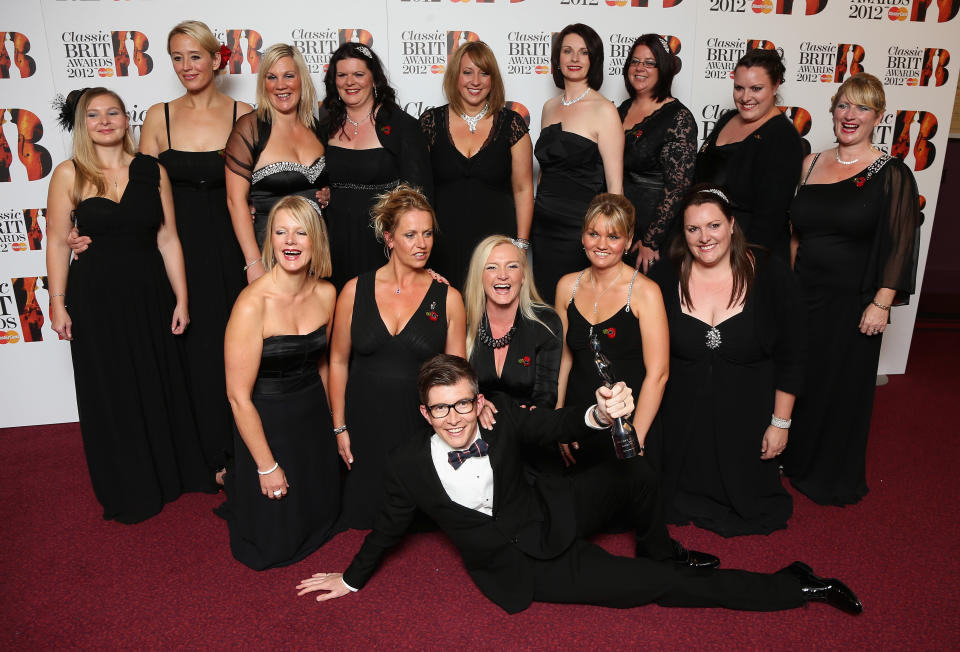
Of course, there is a support network there, but really they needed that choir. They needed something that pulled them all together and focused them and, in a tiny way, took their minds off what was going on there and elsewhere. There’s nothing they can do to change that in any way. They have to wait it out and it can be these six-month tours. Of course they have kids and part time jobs, but there are so many hours of just waiting. Life kind of stops and that seemed really difficult.
Read more: Disney+ UK launch details
Do you have a personal connection to anyone in the military?
No. Kristin [Scott Thomas] has, because she lived on a military base when she was very, very young. So it was really eye-opening.
Is your character based on a specific real-world women?
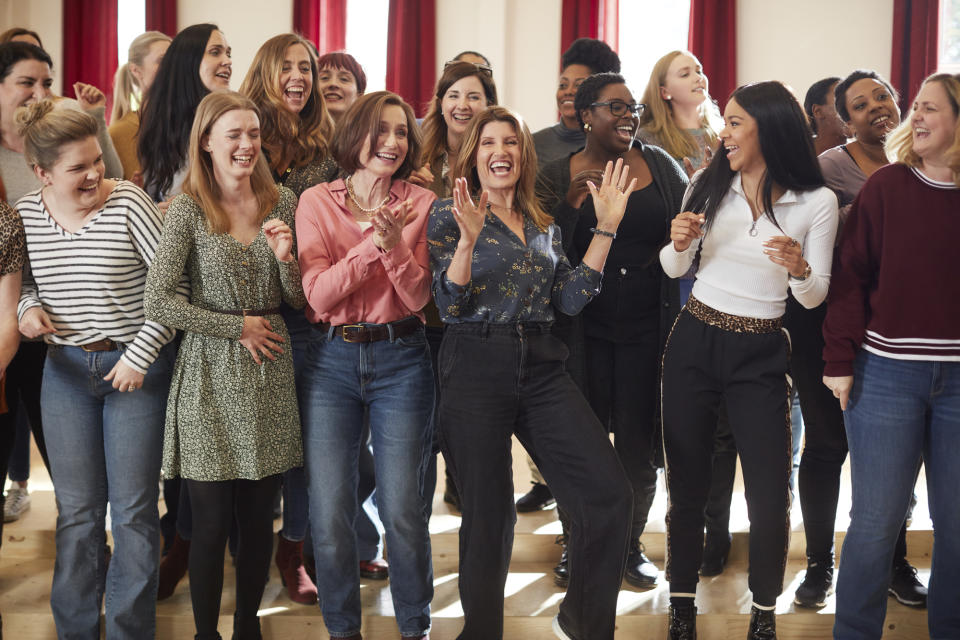
No, not at all. And I didn’t think about doing that at all. When I read the original script, which did change quite a lot, I got why they asked me to do it. I could see a bit of me in there. Or a bit of Sharon from Catastrophe. Someone who obviously feels things – she’s got a softness inside her – but has dealt with her situation by being a bit tougher. Being harsh when she needs to be and being dismissive when she needs to be. And the idea that she had a teenage kid I loved, because I have a teenager daughter herself.
I can’t really imagine her in this situation, but I do know what it’s like to mother a teenage girl. But while she wasn’t based on anyone we met a good number of the wives while we were filming because we were filming on the actual bases and garrisons. We met them and that was really great and helpful, but it was while we were filming.
So you did film on working military bases?
Yeah. It was really eye-opening. [The set of] Kate’s house is the house where the first military wives’ meeting took place.
Was that helpful?
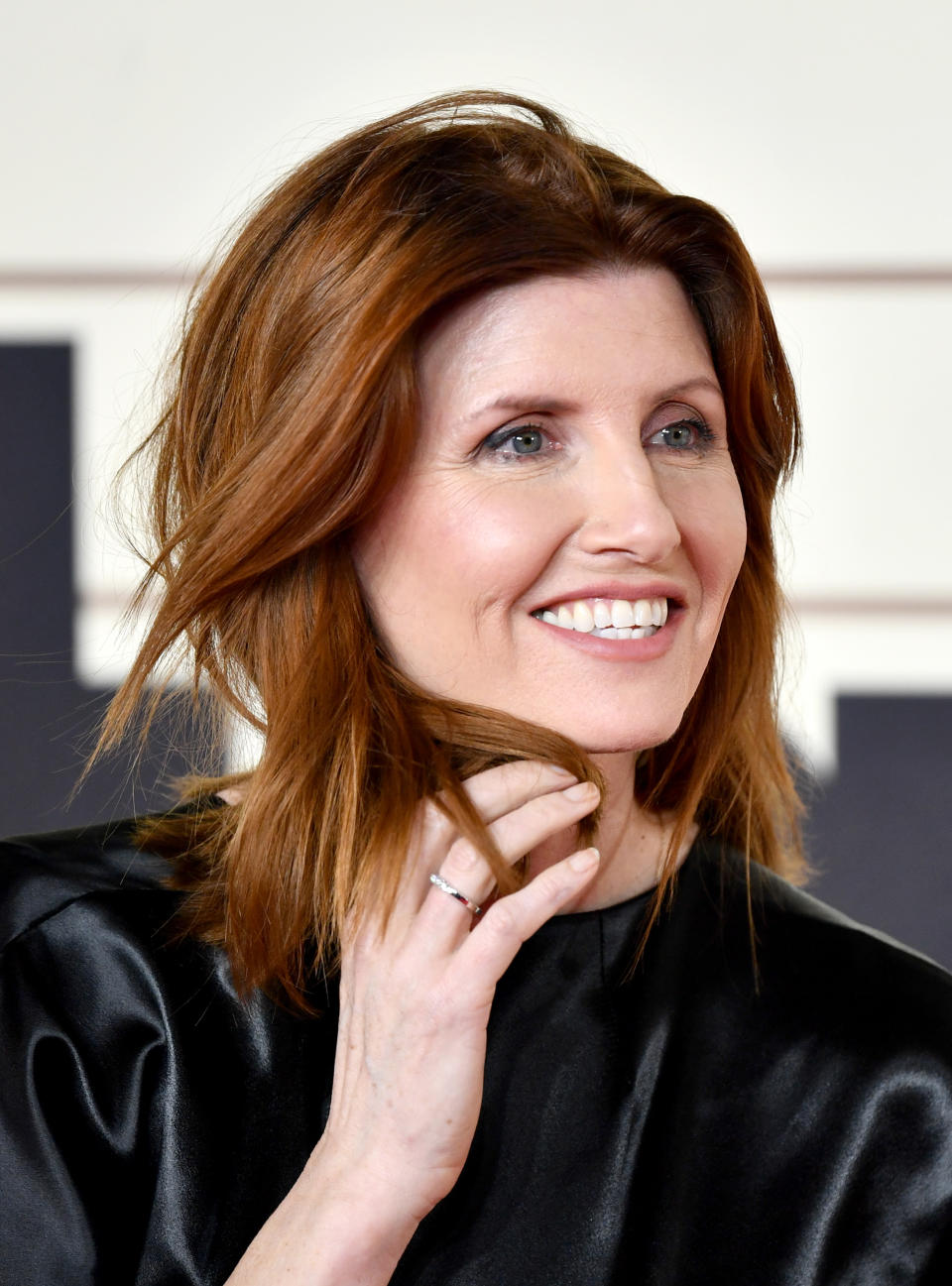
Yeah, just filming in those houses was. You got the sense that it’s quite a transient life. They get moved from base to base and you can’t anchor yourself too much because you might have to up and move. You got the sense that all the houses are quite similar – they can never really take them over and make them their own. I thought, ‘That feels tough.’ To know that you can’t put your roots down.
It’s safe to say this movie passes the Bechdel Test. Is it purposeful that you often work on female-forward projects?
Completely. It’s not by accident. When we set up our production company [Merman] it was with that idea in mind and it’s how we set out our stall and now it’s paying off. I like that. I like telling female stories. And a lot of the female writers and directors and creators come to us now because they know that’s what we do.
Not that I’m not interested in male stories, we just thought ‘Well, there’s an opportunity there to focus on that and if we make a real effort to work with more female directors or tell more female stories what can happen?’ Creatively it’s been really fruitful. And it was nice to also experience that on this film.
What sort of singing experience did you have prior to Military Wives?
I was in a choir in school. So I had done choir singing, but that’s all. But that was perfect. Our director didn’t really want us to have experience because he wanted it to feel authentic. And if he caught us doing too much practice he’d go mad! He’d go, ‘That’s enough now.’ Because sometimes we’d get too excited about a harmony that we’d been taught and want to have a go.
He wanted that to develop over the course of the film. We weren’t able to film it completely in order. We didn’t have the budget to do that. But a lot of the later, more accomplished performances were done later in the filming. So as we go closer to that he allowed us to practice a bit more. What he didn’t want was for it to sound good, but he also didn’t want it to sound fake bad. And, in actual fact, that was easy to do.
How so?
When you first sing together it doesn’t sound good. It takes a while. And that’s what’s beautiful about the film – it makes you understand why it worked for those women and why it felt so necessary and why when they started doing it they didn’t want to stop. You kind of go somewhere else. You’re focused on getting it right. You have this amazing feeling of camaraderie with the women you’re singing with. You get so happy and excited when it sounds in any way good. You’re like, ‘Oh, we did that.’
You genuinely sounded really good together.
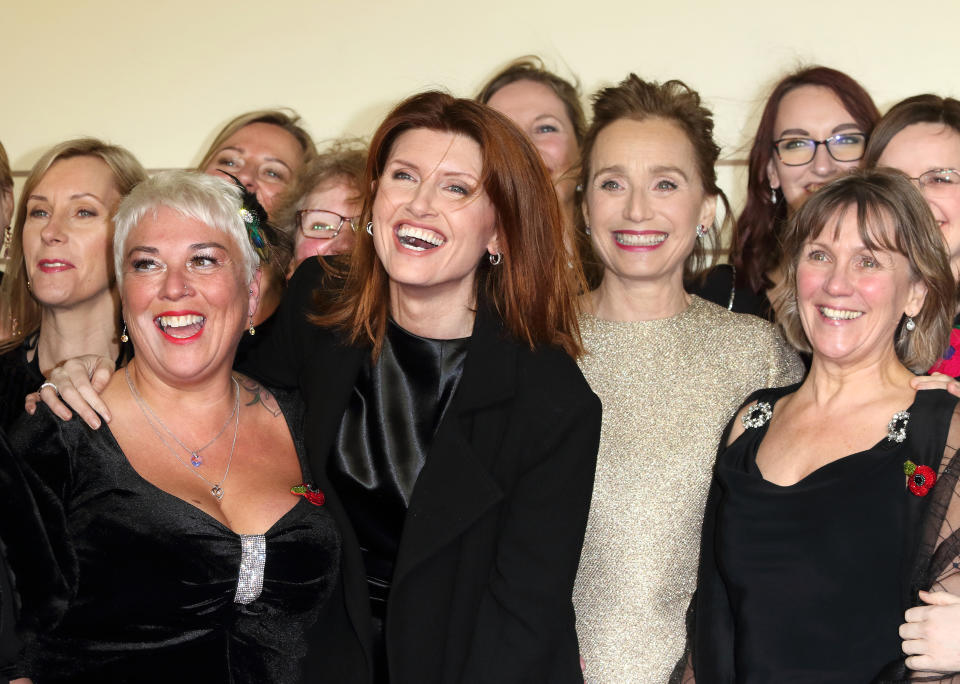
There were a couple of really good singers in the choir. There were about 10 core actors and then there was this larger group. A lot of them were background artists you’d normally have in a film, but then we had a few nice singers in there. Just like in the military wives choir where there would have been a few singers who were just naturally gifted.
Read more: Actors who gave up on accents
But then there’d be the women who were just like you and me could maybe carry a tune and need to practice not to sound awful. There were all sorts of levels of singers in there.
Did it make you want to pursue more musical projects?
I went straight into another film with singing in it! But that was an accident: Everybody’s Talking About Jamie. I was like, “Okay, I’m going to do this film and then I’m never going to do another movie with singing it in ever again.” It was just by chance.
It must have been nice to be part of a movie that is so uplifting, especially with all that’s going on in the world.
It really was. When we saw it play out in Toronto it was kind of amazing because you could feel it having an effect on the audience. It was an amazing feeling just seeing and hearing people’s response. Even though it’s a bit of a tearjerker here and there, there is a real sense of fun and sweetness and good feeling it. It’s a real positive thing.
Military Wives is in UK cinemas from 6 March.

 Yahoo Movies
Yahoo Movies 
